A British woman who is being investigated by police for taking her terminally ill husband to the Dignitas physician-assisted suicide clinic has now revealed how they spent his final moments.
Louise Shackleton took her husband Anthony, 59, to Switzerland last December to assist his suicide, after he had suffered from motor neurone disease for six years.
The pair spent a ‘peaceful’ hour walking in the sunshine, taking in the views of the Alps and talking, before Mr Shackleton turned to his wife and said: ‘It’s time’.
She then pushed her husband’s wheelchair and took him inside the facility to end his life, Mrs Shackleton, 58, told The Mirror.
‘I couldn’t believe how relaxed he was,’ she told the newspaper. ‘It was amazing, honestly, because as humans we have this fear of dying and watching death. But he made it all so comfortable. He was at absolute peace.’
Mr Shackleton had been given an ‘anti-sickness medication’ upon his arrival and was greeted by three ‘knowledgeable’ staff members who ‘explained everything that was going to happen’.
After their walk, he was asked again if he wanted to go through with the process, which would see him take medication, fall asleep and never wake up. Mrs Shackleton claims he smiled, laughed and replied: ‘What do you think I’m here for? Let’s do this!’
Mrs Shackleton laid next to her husband as administered his own end-of-life medication, admitting she ‘couldn’t look at him doing that’. She recalled how she held him in her arms and ‘within minutes he was becoming heavy’.
Mr Shackleton told his wife ‘I feel sleepy’ and let out a snore, prompting her to hold him tighter as she joked about his snoring. She says ‘he laughed and gently slipped away’ in what she described as a ‘beautiful death’.
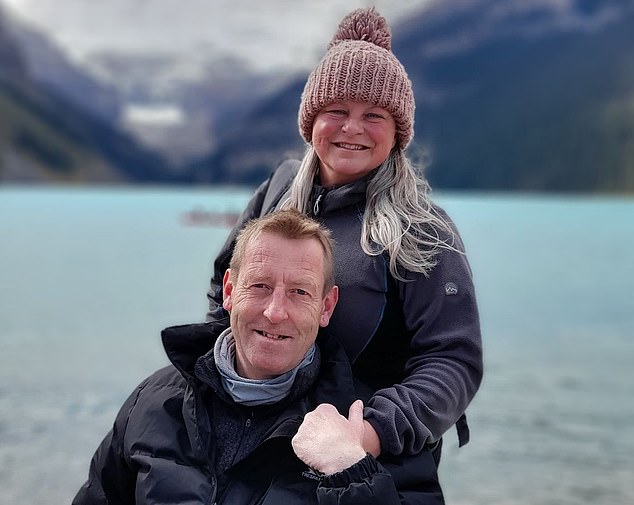
Louise Shackleton took her husband Anthony, 59, to Switzerland in December to assist his suicide, after he suffered from motor neurone disease for six years. They spent a ‘peaceful’ hour walking in the sunshine, taking in the views of the Alps and talking before he died

Mrs Shackleton laid next to her husband as administered his own end-of-life medication, admitting she ‘couldn’t look at him doing that’. She held Mr Shackleton (pictured) in her arms and ‘within minutes he was becoming heavy’, sleepy and started snoring. She says ‘he laughed and gently slipped away’ in what she described as a ‘beautiful death’
The Shackletons discussed assisted death from more than two years before deciding it was the only way Mr Shackleton could die without pain or suffering.
It is illegal in the UK to assist someone’s suicide – but people are rarely prosecuted.
The assisted dying bill currently going through Parliament would allow someone with a terminal diagnosis and less than six months to live to end their life, with approval from two doctors and a panel of experts.
The next vote on it has been postponed for three weeks, to give MPs time to think about amendments to the bill.
Mrs Shackleton, from North Yorkshire, has argued that if the laws had been different in Britain, the couple’s family would have been able to support them during his final moments.
She is now speaking out as Parliament gears up to vote on assisted dying legislation in England and Wales.
‘The night before he died, we were sat having a meal and he told me, “I need you to fight other people. I need you to tell my story because I shouldn’t have to do this”,’
Mrs Shackleton gave herself up to police after returning from Switzerland and said that although she ‘committed a crime’, she does not regrets going to Dignitas.
She told Sky News: ‘I have committed a crime, which I have admitted to, of assisting him by simply pushing him on to a plane and being with him, which I don’t regret for one moment. He was my husband and I loved him.’
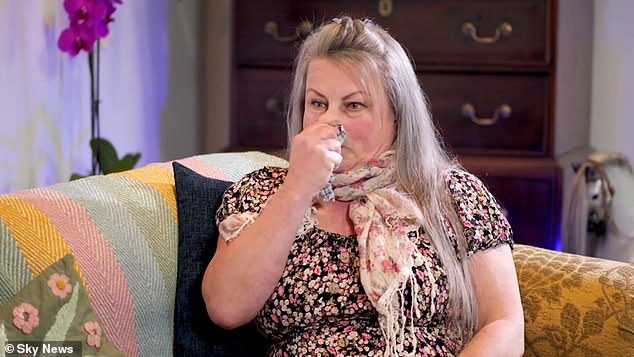
Mrs Shackleton, during an interview with Sky News, said she has chosen to speak out publicly in support of assisted dying because she did not want her husband to die in vain – and because he had made her promise, on his final day, to tell his story
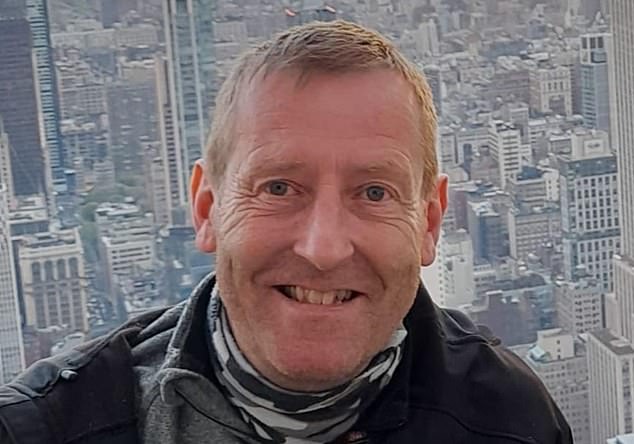
She recalled the kindness and generosity of her husband (pictured), a furniture restorer who had been recognised globally for his handmade rocking horses – and who no one ever had a bad word to say about
Mrs Shackleton said her husband finally relaxed when he boarded the plane to Switzerland at the end of last year – and was happy and at peace throughout the four-day trip.
The couple had been together for 25 years – and had known each other since they were both 18.
She said: ‘It was in those four days that I realised that he wanted the peaceful death more than he wanted to suffer and stay with me, which was hard, but that’s how resolute he was in having this peace.’
And if legislation had been different in the UK, she added, they could have also shared those final days with family.
Concerns have been raised that the assisted dying bill puts vulnerable people at risk, with fears they will feel coerced into making use of what the legislation would allow.
Critics of the bill have also said they worry that it will see attitudes towards the elderly, ill and disabled change – and that the focus should be on improving palliative care instead.
Mrs Shackleton said people need to be safeguarded – but equally, their wishes need to be respected, even if others are not comfortable with them or do not agreed.
She recalled the kindness and generosity of her husband, a furniture restorer who had been recognised globally for his handmade rocking horses – and who no one ever had a bad word to say about.
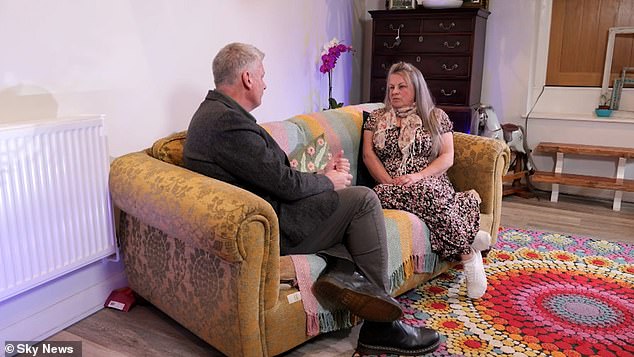
Mrs Shackleton said: ‘This is about a dying person’s choice to either follow their journey through with disease or to die peacefully when they want to, on their terms, and have a good death. It’s that simple’
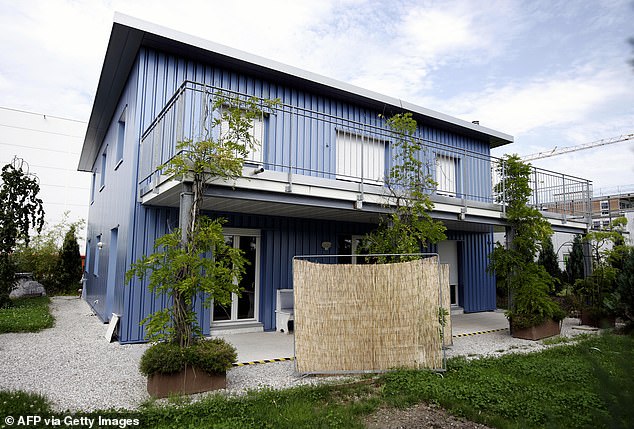
British membership of Dignitas has increased by more than 50 per cent over the last five years. Pictured is a file photo of the Dignitas clinic in Pfaeffikon, near Zurich
She added that she chose to speak publicly because she did not want him to die in vain – and because he had made her promise, on his final day, to tell his story.
Mrs Shackleton said: ‘This is about a dying person’s choice to either follow their journey through with disease or to die peacefully when they want to, on their terms, and have a good death. It’s that simple.’
British membership of Dignitas has increased by more than 50 per cent over the last five years, according to statistics from the Dignity in Dying campaign.
But chief executive Sarah Wootton warns that individuals who cannot afford the £15,000 costs associated with end-of-life care at the Swiss facility are often ‘eft to suffer as they die, or take matters into their own hands’.
She told the Mirror that the Shackletons’ story highlights how the UK’s ‘blanket ban’ on assisted suicide is ‘failing dying people and their loved ones’.
A spokesperson for North Yorkshire Police said: ‘The investigation is ongoing. There is nothing further to add at this stage.’
- For confidential support call the Samaritans on 116123 or visit a local Samaritans branch, see www.samaritans.org for details







